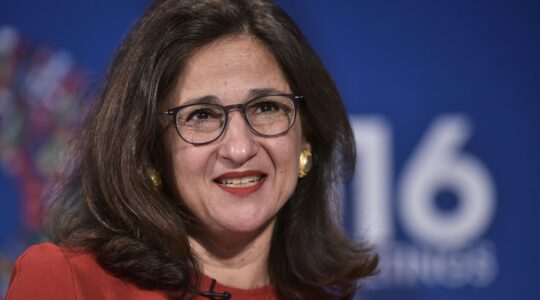WASHINGTON (JTA) — Tensions between Israel and the United States are over, Israeli Defense Minister Ehud Barak said.
Barak, speaking April 29 at the annual American Jewish Committee conference, made a point of joining U.S. Secretary of State Hillary Rodham Clinton, who also spoke, in celebrating the closeness of the U.S.-Israel relationship.
"These differences, the slight disagreements, are behind us," Barak told the attendees, citing Israel’s access to U.S. weapons systems as a sign that the defense relationship is "extremely good."
Clinton echoed the sentiment, saying in her remarks that "regional peace must begin with the recognition by every party that the United States will always stand behind Israel’s security and, as President Obama put it recently, ‘no wedge will be driven between us.’ "
Clinton added, to applause from a friendly audience, "Now we will have our differences, but when we do, we will work to resolve them as close allies."
Tensions flared in early March after Israel announced a major eastern Jerusalem building start during a visit to Israel by U.S. Vice President Joe Biden.
Barak’s remarks came on the eve of the announcement by Clinton that U.S.-brokered talks between Israel and the Palestinians would resume this week.
Barak said in his speech that Israel was committed to arriving at a peace agreement.
"We as a government have a supreme responsibility to protect Israel from any threat, but at the same time turning every stone as we search for peace," he said, adding that continued control of the Palestinian areas means Israel "will become inevitably not Jewish or not democratic. Neither is the Zionist dream."
Barak also noted the massive arms build-up by Hezbollah in Lebanon, and said Israel would not limit its retaliation for an attack to the terrorist group.
"The government of Lebanon will be held accountable if the situation deteriorates," he said.
The Israeli defense chief suggested that arguments over which sanctions to choose to spur Iran toward greater nuclear transparency were less important than establishing a united front.
"Tough or crippling or paralyzing or deadly — I don’t care," he said. "It should be effective."





